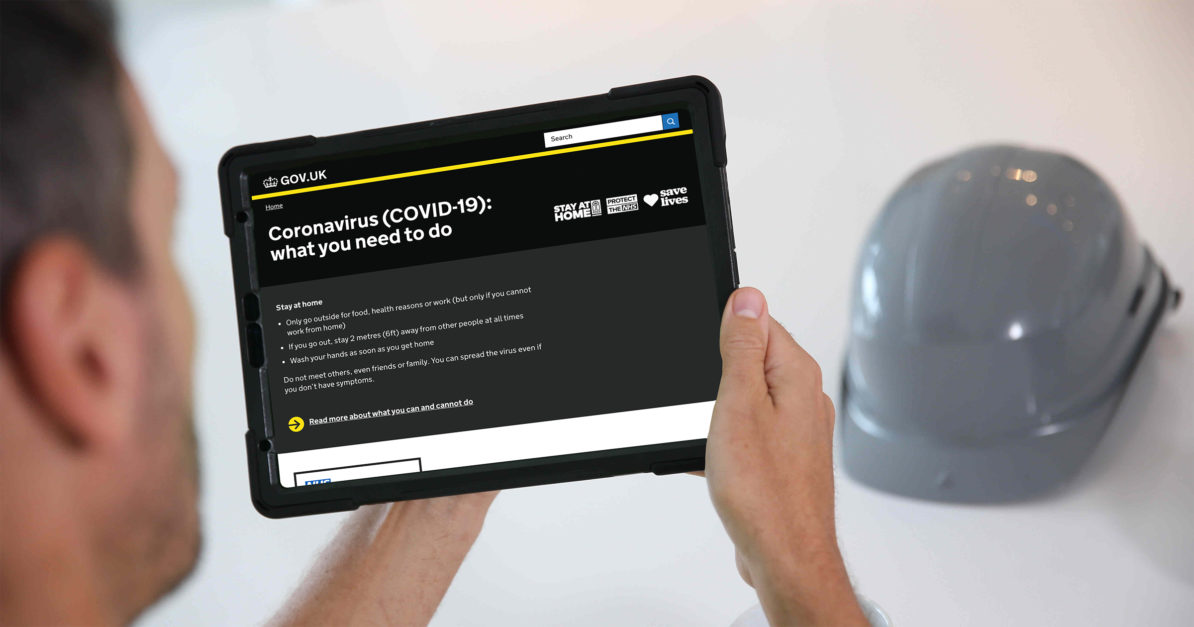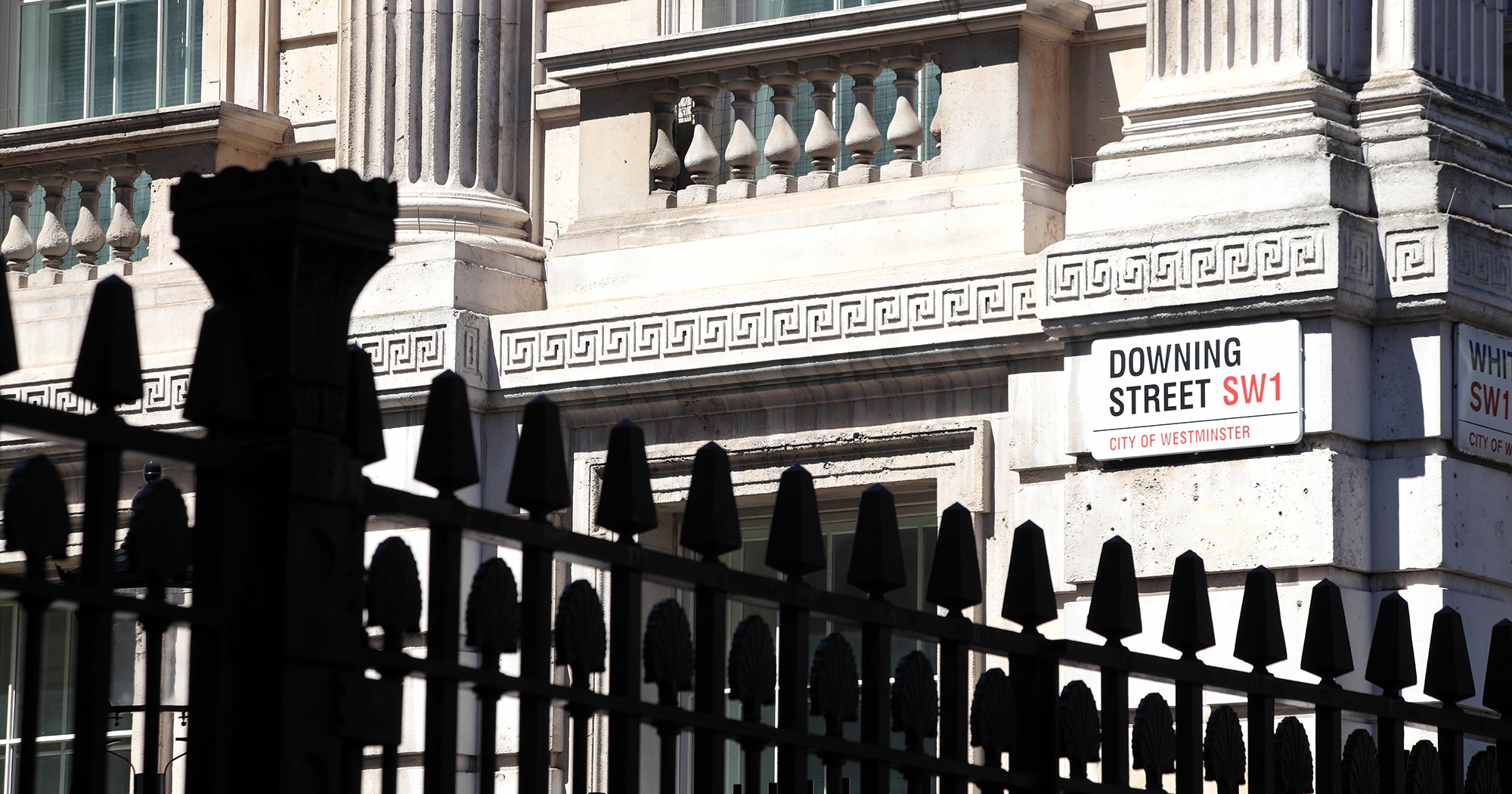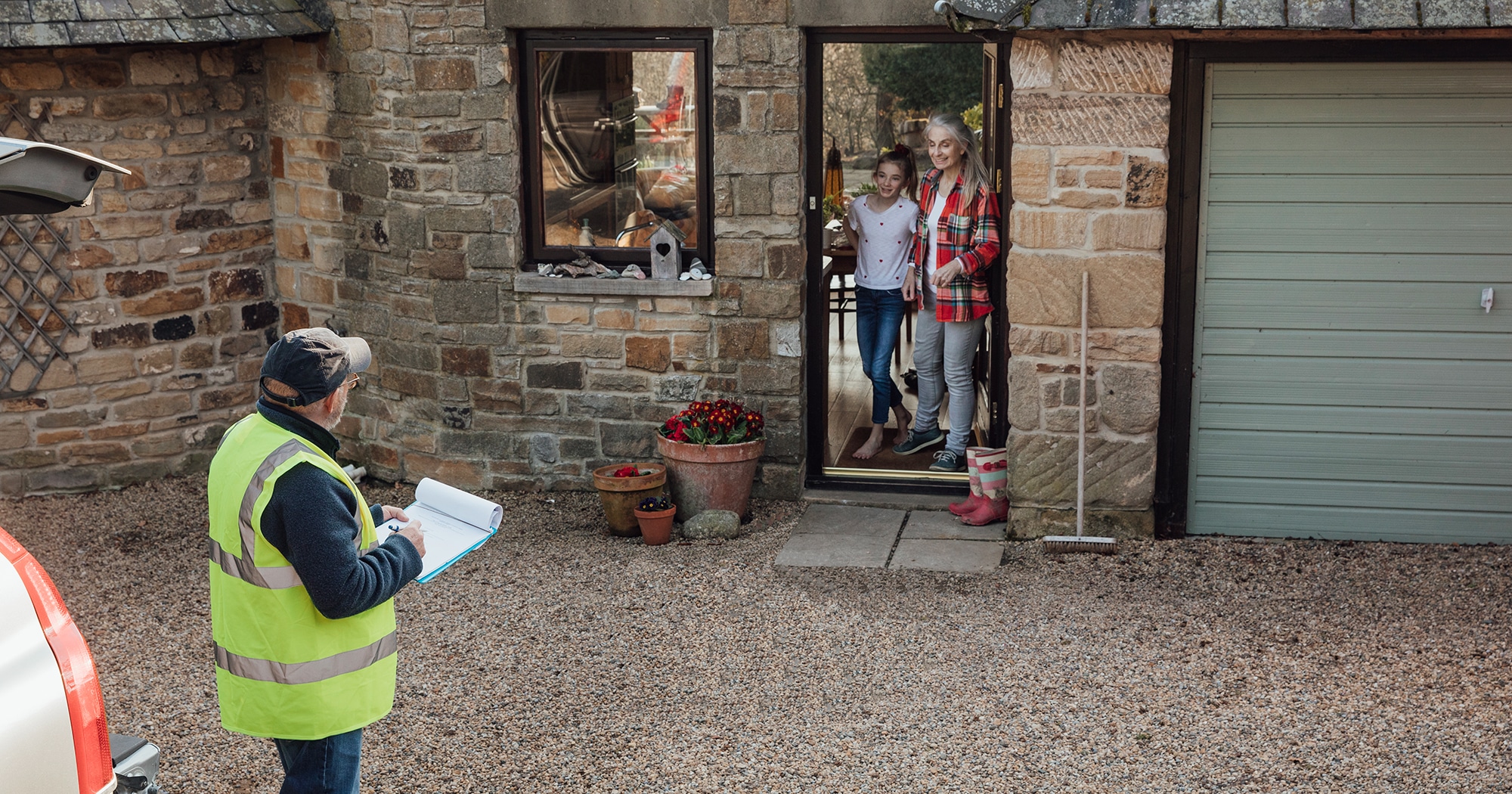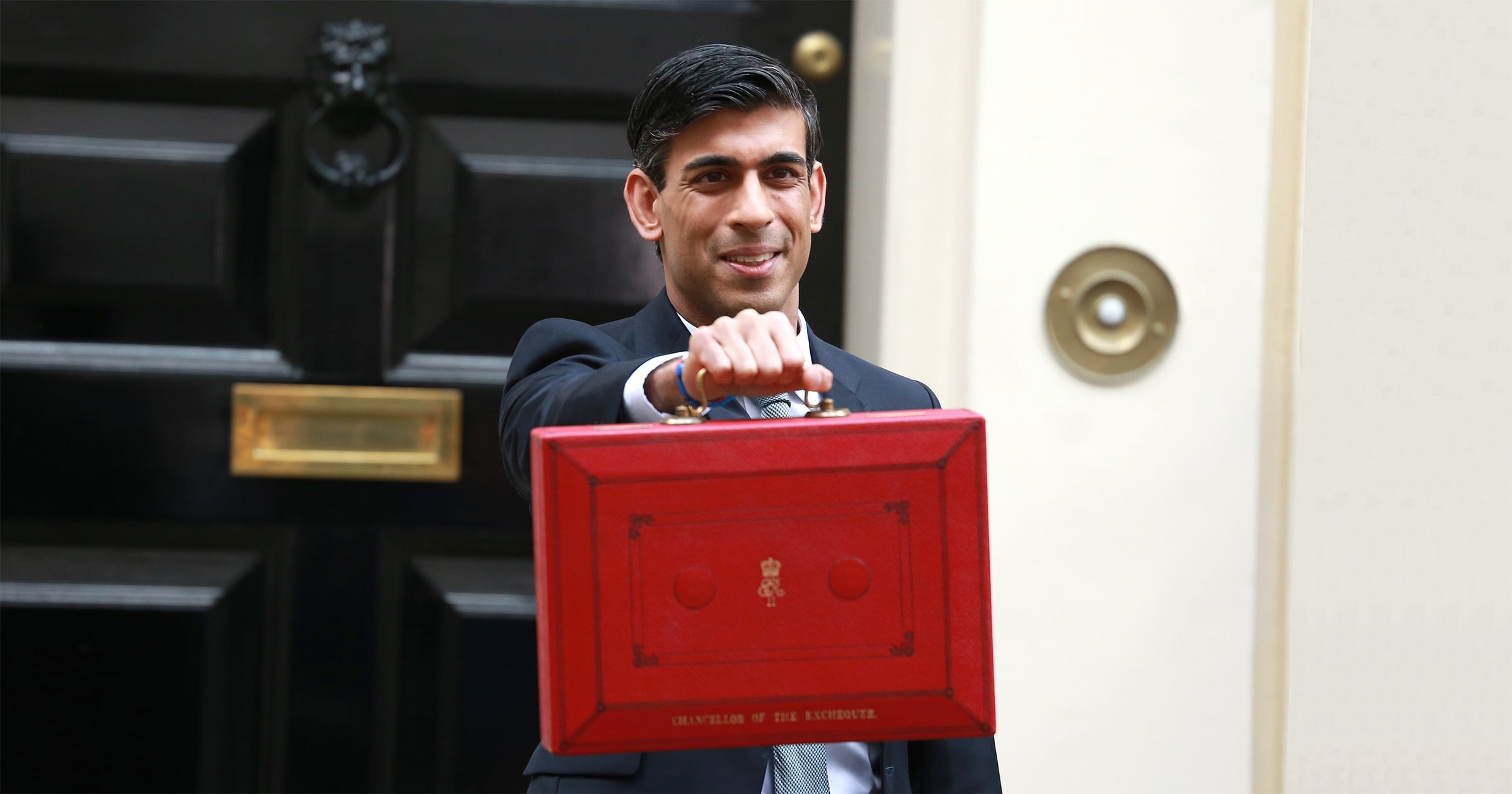
Introduction
Last updated: 2 Oct 2020With information on the coronavirus (COVID-19) outbreak changing almost hour by hour, and no central resource for tradesmen, we have decided to prepare some information, guidance and support to help tradespeople during this difficult time.
If you can’t find what you’re looking for after reading this guide, simply Ask A Question and our team will find you the answer.
Within each section below you will find an “Updated” notice. It is important that you check the “Updated” date to see when each section was last updated. If you have any reservations about our guidance, please visit the resources found in each section:
- Introduction
- Government Advice for Tradespeople
- Working in People’s Homes
- Before A Visit
- During A Visit
- Self Isolating or Shielded Households
- Get Work’s Advice for Tradespeople
- Family Safety
- Cash Flow
- Local Demand
- Supply Chain
- Employees & Subcontractors
- Continuing To Work Safely
- Personal Protective Equipment (PPE)
- Face Masks
- Single Use Gloves
- Eye Protection
- Operational Considerations
- Continuing to Work
- Working from Home
- General Considerations
- Financial Support for Tradespeople
- Your Questions (FAQ)
- Ask A Question

Government Advice for Tradespeople
Updated: 2 Oct 2020The current government advice for tradespeople, confirms that tradespeople undertaking domestic work can continue to do so, as long as they follow Public Health England guidelines. You can find further information on working in other people’s homes on the GOV.uk website.
Work carried out in people’s homes, for example by tradespeople carrying out repairs and maintenance, can continue, provided that the tradesperson is well and has no symptoms. Again, it will be important to ensure that Public Health England guidelines, including maintaining a two metre distance from any household occupants, are followed to ensure everyone’s safety.
No work should be carried out in any household which is isolating or where an individual is being shielded, unless it is to remedy a direct risk to the safety of the household, such as emergency plumbing or repairs, and where the tradesperson is willing to do so. In such cases, Public Health England can provide advice to tradespeople and households.
No work should be carried out by a tradesperson who has coronavirus symptoms, however mild.
The UK Government also published sector guidance for tradespeople working in people’s homes on the 7th April 2020, which has been further updated on the 4th May. This advice outlines what tradespeople should do before and during a home visit, as well as further direction on visiting households that are self-isolated or households with shielded individuals:
Working in People’s Homes
Updated: 2 Oct 2020If you’re a tradesperson carrying out essential work in people’s homes, you can continue to work providing:
- you follow the GOV.uk guidance when working in people’s homes
- you follow the guidance on social distancing
- you do not carry out work in a household which is self-isolating or where someone is being shielded, unless the work is an emergency
- You should also not carry out any work in people’s homes if you have symptoms of coronavirus yourself, however mild.
Before A Visit
You should assess whether the visit is essential or if the work can be safely postponed. There may be alternatives to a visit, such as a phone or video call.
If the visit needs to go ahead, you should ask the customer if anyone in the household:
- has symptoms of coronavirus and is self-isolating
- is a vulnerable person who is shielding
You should notify customers in advance of your arrival, so they can take appropriate measures.
During A Visit
If you’re visiting a customer’s property to carry out work, you need to follow these guidelines:
- You should wash your hands regularly, particularly before you enter a property and after you leave. Where facilities to wash your hands are not available, you should use hand sanitiser.
- You should not touch or shake hands with the customer. You should avoid close contact by maintaining at least 2 metres distance (around 3 steps) from them during the entire visit.
- You should avoid touching any surfaces or objects other than those necessary to do the work.
- Every effort should be made to increase ventilation in the area where the work is being done, for example by opening any windows.
- You should decline offers of food and drink from the customer during the visit and should not eat, drink or handle food while you are on site.
- You should avoid using the toilet during your visit, if possible.
Self-Isolating / Shielded Households
No work should be carried out in any household which is self-isolating or where an individual is being shielded, unless your work is to remedy a direct risk to the safety of the household, such as emergency plumbing or repairs.
If the work needs to go ahead, you will need to take additional steps to ensure the safety of the customer and yourself.
You should ask the householders to stay in a separate room while the work is carried out. If this is not possible, they should stay as far away from you as possible.
Prior arrangements should be made with vulnerable people to avoid any face-to-face contact – for example, when answering the door. You should be particularly strict about hand washing and respiratory hygiene.
Once the work is completed, you should tell the customer which surfaces and areas you have come in to contact with. These should be then be cleaned thoroughly. Where possible, you should carry out this cleaning yourself if the customer is unable to do so. Read the guidance on cleaning and waste.
Whilst this is the government’s advice, in these uncertain times, there are a number of factors to consider before proceeding to work.
Not found what you were looking for? Ask A Question and our team will find you the answer.

Get Work’s Advice for Tradespeople
Updated: 8 May 2020Unfortunately, there isn’t a one size fits all approach to the situation we are facing. You should assess a combination of the following factors to help decide whether the government’s advice is in your best interests. We will try to provide you with the same advice we would give to our closest family and friends in the sections below:
Family Safety
Our advice is to prioritise your family’s safety and to stay at home. Whilst we believe the government are doing an incredible job, especially with the timescales and resources available to them, they have to balance your safety with the impact of changes on the economy.
Your family’s safety should always be your number one priority. We recommend that if you can afford to shut down temporarily and weather the storm, you definitely should, although we understand that many are not in a position to do this indefinitely.
The recommendation to stay at home and protect your family, stems from the incubation period of the COVID-19 virus. According to the World Health Organisation, the COVID-19 virus has an incubation period of 1-14 days. This means that many people won’t show symptoms or realise that they have the virus, so to be as safe as possible, you should avoid contact with people outside of your household.
Cash Flow
Unfortunately, our primary recommendation above isn’t an option for some due to financial constraints. We do advise that you pay close attention to the Financial Support for Tradespeople section at the bottom of this page, before making any decisions, as there may be support available, allowing you to stay at home in the short-term.
Local Demand
At present, search volumes for home services have remained positive; especially for external works such as roofing, driveways and landscaping, and essential services such as electrical, plumbing and heating. We expect search volumes to increase further as more and more people are forced to work from home and more incomes become protected by the UK government. We will continue to monitor search volumes for all customers and relay any significant changes, as we’re aware that this may impact your decision to stay at home.
Supply Chain
Updated: 8 May 2020Most trade merchants and suppliers are now open for business; either via click and collect or through delivery services, which is a huge difference from just a few short weeks ago. Many tradespeople are reporting that it is still taking in excess of 7 days to source some materials, supplies and tools, so this will again impact your decision to continue trading. We advise that you keep an eye on your local supply chain, keep your customers and prospects informed of the situation and react accordingly.
We’ve listed some of the UK’s most popular builders merchants and suppliers below, along with their current status:
| Mostly Open Check your local branch here Call and collect, delivery to site or home. | |
| Mostly Open Check your local branch here Deliveries and a managed collection service. | |
| Mostly Open Check your local branch here Click and collect, click and deliver. | |
| Mostly Open Check your local branch here Home delivery, click & collect. | |
| Mostly Open Check your local branch here Home delivery and click & collect. | |
| Mostly Open Check your local branch here All stores open for home delivery and click & collect. | |
| Mostly Open Check your local branch here Delivery service and click & collect. | |
| Mostly Open Check your local branch here Collect at your local depot. | |
| Mostly Open Check your local branch here Delivery and collection hubs. |
Employees & Subcontractors
Depending on the size of your company, and whether you employ or subcontract workers, the availability of your people will again affect your decision to stay operational. It is important to stay in close contact with workers to ensure you’re up to date with their intentions and/or availability. If you are worried about supporting your workers, there’s help outlined in the Government Support for Tradespeople section.
Not found what you were looking for? Ask A Question and our team will find you the answer.

Continuing To Work Safely
Updated: 8 May 2020According to government guidelines, tradespeople can continue to provide services at and within people’s homes, provided that they;
- Have no symptoms of the COVID-19 virus.
- Do not enter households that are isolating.
- Do not enter the households of individuals being shielded, other than to remedy a direct risk to the safety of the household, such as emergency plumbing or repairs.
If after assessing your options in our Government Advice and Get Work Advice sections above, and you feel you have no choice but to keep working, it’s imperative that you follow Public Health England guidelines:
- Keep two metres away from others at all times.
- Ensure you are washing your hands numerous times during the day, for 20 seconds using soap and hot water.
- Use hand sanitiser when you are out and about (if soap and water is not available).
- Make sure you wash your hands when you: Get home or into work, Eat or handle food, Blow your nose, sneeze or cough.
- Do not touch your eyes, nose or mouth.
- Always cough and sneeze into a tissue (or your sleeve), then bin the tissue immediately and wash your hands or use a hand sanitising gel.
- Clean and disinfect frequently touched objects and surfaces regularly, such as your tools, equipment, phone and steering wheel.
- If you develop symptoms, however mild, you’ll need to stay at home for 7 days (symptoms include a new, continuous cough and/or high temperature); or, if you are believed to have been in contact with someone who has symptoms of the COVID-19 virus, you need to self isolate for 14 days.
Personal Protective Equipment (PPE)
Special consideration needs to be given to the current shortage of PPE available to our health care workers. Without face masks, eye protection and single-use gloves; doctors, nurses and other medical personnel are at an increased risk of contracting the COVID-19 virus. Our front line health care workers deserve the best protection. Consider donating your PPE to local hospitals to help those most in need.
If it were not for the shortage mentioned above, we would recommend the use of Personal Protective Equipment (PPE) to safeguard you, your team, and the homeowners you serve. This would also provide reassurance to customers that you are carrying out the necessary precautions to limit transmission. As such, we recommend that you monitor the situation and only wear PPE if our health care workers are not affected.
Keep reading for further information and our recommendations about using PPE for COVID-19:
Face Masks
The use of face masks will provide protection against hand-to-mouth transmissions, as long as the recommended guidelines are followed. The World Health Organisation (WHO) has provided advice for the public, outlining when and how to use masks.
There are different types of face masks available for your protection that can be broadly categorised as; surgical masks and respirators.
Surgical/Disposable Masks: There has been no conclusive proof that surgical masks offer protection from airborne cough droplets, which is thought to be the main route of transmission for COVID-19. However, they will protect the wearer from hand-to-mouth transmissions, with studies showing that we touch our faces up to 23 times an hour.
Respirators: Respirator masks are designed to protect the wearer from particles in the air. To be effective, the mask must form a perfect seal to your face so there are no gaps to allow the airborne virus to enter. Respirators can come as a disposable or as a re-usable mask.
Single Use Gloves
Regularly washing your bare hands offers more protection against the COVID-19 virus than wearing gloves. Gloves can still become contaminated with COVID-19, increasing the risk of virus transmission if used incorrectly.
We recommend against using gloves, unless they form part of your usual armoury. Consider the following advice on glove use from the World Health Organisation (WHO) if you are already or plan on using gloves:
- Wash your hands thoroughly (or use an alcohol-based handrub) before donning gloves.
- Place the gloves using the correct technique which prevents their contamination.
- Use the correct technique for removing gloves which prevent your hands from becoming contaminated.
- Dispose of your gloves safely.
- Wash your hands thoroughly with soap and water or with an alcohol-based handrub after removing gloves.
- Do not reuse single-use gloves.
Eye Protection
It may be possible that a person can contract COVID-19 by touching an object or surface contaminated with the virus and then touching their eyes, however this is not thought to be a common route of transmission.
If eye protection already forms part of your regular health and safety routine, then continue to wear your PPE as normal. If eye protection does not form part of your regular health and safety routine, please consider our health care workers during this time. Good hand hygiene and refraining from touching your eyes will prevent hand-to-eye transmissions.
The above recommendations have been made using World Health Organisation (WHO) advice.
Not found what you were looking for? Ask A Question and our team will find you the answer.

Operational Considerations
Updated: 8 May 2020How you choose to operate going forward will largely depend on your decision to work from home or at homeowner properties. As such we have made some operational recommendations based on both situations.
Continuing to Work
We understand that many tradespeople will need to continue working to provide for their families. If you fall within this bracket, we ask that you follow all guidance in our Continuing To Work Safely section. In addition to the advice, you should also consider the following:
- Contact your customers for any upcoming jobs: Reassure them that you are on track to commence work on time, are following COVID-19 guidance from Public Health England and have the required PPE/antibacterials needed to complete their job. Ask if anyone in the household is displaying any symptoms or is self isolating, if so, reschedule the appointment. Reassure the customer that you are not showing any symptoms and are taking necessary precautions.
- Contact suppliers (if they are operating): Try to maintain a secure supply of materials, tools and equipment for upcoming jobs. It is worth contacting your merchant and plant hire suppliers where needed for assurances.
- Contact your employees and subcontractors: It’s important to get regular updates from your team so you know who is available to complete outstanding work.
Working from Home
If you’re working at home, you now have the unique opportunity to prepare for the resurgence of the economy. The financial packages put in place by the UK government, and the restrictions on where you can currently spend money will see individuals and households cope for the short-term. People are likely to be more prudent with their money during this time and save where possible. The opportunity for tradespeople is to be ready when these restrictions are lifted, and especially if restrictions are lifted early, with homeowners saving all they can in case of a long-term situation.
Here are some steps that you can take to be prepared when the restrictions are lifted:
- If you can afford it, continue advertising: We hope that you take this advice at face value, and of course this will be dependent upon your financial situation, but most tradespeople will now look to cut their marketing budgets and bury their heads in the sand. This in turn reduces the amount of competition you’re up against, and makes it much easier to get your company in front of homeowners. As we mentioned earlier, people are still searching for your services and we anticipate that this will only increase as more people work from home. Make use of the time to fill your order book with larger jobs. Find people with buying intent and sell yourself, with a view to completing work when restrictions are lifted.
General Considerations
The following are operational considerations that apply whether you’re continuing to work, or working from home:
- Contact any main contractors or customers that owe you money: It’s important to do this as quickly as possible. Ask for settlement to preserve your cashflow.
- Avoid taking cash payments, instead accept payment by bank transfer or card where possible.
Not found what you were looking for? Ask A Question and our team will find you the answer.

Financial Support for Tradespeople
Updated: 8 May 2020There’s a whole host of financial support available for UK tradespeople as a result of the COVID-19 virus. We’ll let you know what’s available and how you can get your hands on it. Financial support available to UK tradespeople is being updated daily, so we will update this page as information is released. Visit HM Government’s Business Support website for more information or try their new Business Support Finder to see what you’re eligible to apply for. We’ll try to condense all of the support options available to tradespeople here:
Paying your employees: Coronavirus Job Retention Scheme. Grants will be for 80% of salary, up to a monthly ceiling of £2,500. The online application portal is now open and a step-by-step guide for employers is available. The scheme will be open until the end of June.
Support for the self-employed: Self-employment Income Support Scheme. Grants worth 80% of their profits up to a cap of £2,500 per month, for each self-employed worker.
Paying sick pay: Rebates for Statutory Sick Pay and support through the Universal Credit system for the self-employed.
Paying tax: Deferral of VAT payments until 31 March 2021. Also defer your self-assessment payments until 31 January 2021, or seek support through HMRC’s Time to Pay service.
Getting a loan: The Bounce Back Loan Scheme (BBLS) enables smaller businesses to access finance more quickly during the coronavirus outbreak. Businesses can apply for a loan up to 25% of their 2019 turnover up to a maximum of £50,000. The Government provides lenders with a 100% guarantee and will pay all fees and interest in the first 12 months. Loans will continue for a further 5 years at 2.5%. Loan applications involve a simple form and businesses have been receiving loan payments one working day after approval. If your business requires more than £50,000, you will need to use the Coronavirus Business Interruption Loan Scheme (CBILS).
Business rates relief: Small Business Grant Fund.
Do you have a finance question that’s not been answered? Ask A Question and we’ll reach out to our award-winning partner Danbro for an answer.

Frequently Asked Questions (FAQ) About Coronavirus for Tradespeople
Updated: 8 May 2020We’ve compiled a list of questions asked by our tradespeople about coronavirus (COVID-19) that will hopefully help you at this time.
In short, yes, as long as government guidelines are maintained. For the latest government guidelines, see above. There’s also a list of mandatory businesses that need to close in the UK, which can be found here; domestic trades are not considered as a business type that needs to close because of the coronavirus (COVID-19) pandemic.
The government has issued a list of businesses that are required to close by law in the UK, which can be found here; domestic trades are not considered a business that needs to close because of the coronavirus (COVID-19) pandemic. Government guidelines still need to be maintained if visiting UK homes. For the latest government guidelines, see above.
UK tradesmen are not on the list of UK businesses that have to close by law. The government’s most current advice confirms that tradesmen undertaking domestic work can continue to do so, as long as they follow sector guidelines.
It is very important that tradesmen follow the government’s guidance when working on or in UK homes. All tradespeople should follow the guidance on social distancing. You should not carry out work in a household which is self-isolating or where someone is being shielded, unless the work is an emergency. Under no circumstances should you carry out any work in people’s homes if you have symptoms of coronavirus yourself, however mild. You can read the full government sector guidance here.
Make sure you follow the government’s sector guidance for tradespeople and also GOV.uk’s guidance on how to protect your workforce and customers.
The current government advice for roofers, as outlined in their closure guidance, confirms that roofing companies undertaking domestic roofing work can continue to do so, as long as they follow sector guidelines. With roofing being external, it shouldn’t be too complicated to assess, quote and carry out any necessary works and at the same time avoiding direct contact with customers.
The UK government’s advice for builders, as outlined in their closure guidance, states that building companies carrying out domestic building work can continue to do so, as long as they follow sector guidelines. The only UK businesses that have to close by law, can be found in Gov.uk’s business closure guidance.
The current government advice for landscapers and landscape gardeners, as outlined in their closure guidance, confirms that landscaping companies undertaking domestic landscape gardening work can continue to do so, as long as they follow sector guidelines. With landscaping and gardening being external work, it shouldn’t be too complicated to assess, quote and carry out any necessary works without coming into direct contact with customers.
The current government advice for driveway specialists, as outlined in their closure guidance, confirms that driveway companies undertaking domestic paving and driveway work can continue to do so, as long as they follow sector guidelines. With driveway installations being external to homeowner properties, it shouldn’t be too difficult to assess, quote and carry out whilst avoiding direct contact with customers.
The government’s current advice for plasterers, as outlined in their closure guidance, confirms that plastering firms undertaking residential plastering work can continue to do so, as long as they follow sector guidelines. The only businesses that have been forced to close by the UK government, can be found in Gov.uk’s business closure guidance.
The current government advice for external renderers, as outlined in their closure guidance, confirms that rendering companies undertaking domestic render projects can continue to do so, as long as they follow sector guidelines. As rendering projects are largely on the outside of people’s homes, it shouldn’t be difficult to assess, quote and carry out your job without physically seeing customers.
The government’s advice for electricians, as outlined in their closure guidance, confirms that electricians can continue to provide domestic electrical work, as long as they follow sector guidelines. Electricians were told to perform only essential maintenance and repairs at the start of the pandemic, but the government has since issued sector guidance for tradespeople.
The current government advice for painters and decorators, as outlined in their closure guidance, confirms that painters undertaking domestic decorating work can continue to do so, as long as they follow sector guidelines. Painters and decorators should, however, assess whether their visit is essential or if the work can be safely postponed. There may be alternatives to a visit, such as a phone or video call. If the visit cannot be postponed you should agree procedures in advance.
The current government advice for carpenters and joiners, as outlined in their closure guidance, confirms that carpentry and joinery companies undertaking domestic work can continue to do so, as long as they follow sector guidelines. Carpenters and joiners should, however, assess whether their visit is essential or if the work can be safely postponed. If the visit cannot be postponed you should agree procedures in advance.
The current government advice for plumbers, as outlined in their closure guidance, confirms that plumbers undertaking domestic plumbing work can continue to do so, as long as they follow sector guidelines. Plumbers have always been able to perform essential maintenance and repairs during the coronavirus (COVID-19) pandemic.
The current government advice for heating specialists, as outlined in their closure guidance, confirms that heating companies undertaking domestic heating work can continue to do so, as long as they follow sector guidelines. Heating specialists can continue to perform essential maintenance and repairs during coronavirus.
The current government advice for loft converters, as outlined in their closure guidance, confirms that loft conversion companies undertaking domestic loft projects can continue to do so, as long as they follow sector guidelines. Loft conversion companies should, however, assess whether their visit is essential or if work can safely be postponed. If a visit cannot be postponed, procedures should be agreed in advance.
There aren’t any volume restrictions for tradespeople working in other people’s homes at present. So there isn’t a daily limit you would need to stick to. You will just need to follow the guidance found on this .gov link: Working Safely During Coronavirus in People’s Homes. In short, as an employer, you will need to provide your workers with information about how to operate safely in people’s homes; social distancing, cleaning surfaces, PPE, etc. Give the link above a thorough read, and put together a risk assessment for any work you undertake at people’s homes.
Not found what you were looking for? Ask A Question and our team will find you the answer.
Are there restrictions on the number of properties you can access in a day? We are plumbers and a repair might take 30 minutes to do, meaning in any given day you could undertake quite a few jobs.
Hi John! Thanks for submitting your question! There aren’t any volume restrictions for tradespeople working in other people’s homes at present. So there isn’t a daily limit you would need to stick to. You will just need to follow the guidance found on this .gov link: Working Safely During Coronavirus in People’s Homes. In short, as an employer, you will need to provide your workers with information about how to operate safely in people’s homes; social distancing, cleaning surfaces, PPE, etc. I would give the link a thorough read and put together a risk assessment for any work you undertake at people’s homes. I hope this helps, let us know if you have any further questions!
A tradesmen has been in my house and has now tested positive for COVID, should I self isolate?
Yes Garth, self isolate and book a test straight away. It may be useful to download the NHS app as it offers personal guidance in these situations. Thanks!
Are Mobile Hairdressers with disposable ppe allowed to still work
I am an electrician and have been asked to do some maintenance in a Nursing Home. Should I have a test for Covid-19 before start the work?
Hi Frank, the government has issued specific advice for those working in care homes: COVID-19 Guidance: How to work safely in care homes. Whilst this is not directly written for tradespeople, much of the advice is applicable. You can also find advice on working in other people’s homes, which may help. It may also be worth getting in contact with the care home to see if they have any internal requirements, i.e. specific PPE, social distancing from residents, etc. With regards to a test, you are only supposed to get a test; if you have coronavirus symptoms (a high temperature, a new, continuous cough, or a loss or change to your sense of smell or taste), if someone you live with shows symptoms, if you live in England and have been told to have a test before going into hospital, for example, for surgery or if your local council asks you to get a test. Any updates to those that can be tested will be published here. It may be worth reaching out to your local council to see if you are able to get a test before starting work, given the risks involved. Hope this helps, let us know if you have any further questions!
Do builders / electricians / painters / window cleaners have to wear a mask when working indoors in a pub?
Hi Kirsty, thanks for submitting your question! The most specific advice to help keep you and your workplace COVID-secure can be found here. Would the pub be open with customers? Or are you working on a closed site? Let us know and we’ll do some digging for you! Thanks!
If general work men that have to come and do tests everyweek.Should they wear masks when going round the building?
l am a sales representative visiting customer houses l am in a group 2 some of my appointments are in group 3
1 Am l allowed to visit households.
2 Am l allowed to go from a tier 2 to a tier 3.
Can a householder demand you take one of his corona virus tests before entering his house ?
I fitted built in wardrobes for my job in people’s homes can I still work through the second lockdown
Hi I’m an engineer working in people’s homes during lockdown, do my customers have to also wear a face mask ? John.
Hi John, we recommend that you should both wear a facemask when in the same space. If at all possible, have your customers leave the room, or better still, leave the house when you’re working. Make sure you undertake a full risk assessment so you know your own process when working in other people’s homes; in terms of cleaning, ventilation, equipment, clothing, PPE etc. Here are two templates from Manchester University and the HSE to get you started.
As an electrician, if my customer wants me to do work but I know its not essential, should I be putting them off until the restrictions are lifted especially if they are elderly (over 70)?
Hi Neil, thank you for the question!
First and foremost, no work should be carried out in a household which is isolating because one or more family members has symptoms or where an individual has been advised to shield – unless it is to remedy a direct risk to the safety of the household.
When working in a household where somebody is clinically vulnerable, but has not been asked to shield, for example, the home of someone over 70, prior arrangements should be made with vulnerable people to avoid any face-to-face contact, for example, when answering the door. You should be particularly strict about handwashing, coughing and sneezing hygiene, such as covering your nose and mouth and disposing of single-use tissues.
Staying updated with the latest guidance and considering how it can be applied to your work. This can include:
– washing your hands more often than usual for 20 seconds using soap and hot water, particularly after coughing, sneezing and blowing your nose
– reducing the spread of germs when you cough or sneeze by covering your mouth and nose with a tissue, or your sleeve (not your hands) if you don’t have a tissue and throw the tissue in a bin immediately, then wash your hands
– cleaning regularly touched objects and surfaces using your regular cleaning products to reduce the risk of passing the infection on to other people
– maintaining social distancing guidelines (2m, or 1m with risk mitigation where 2m is not viable) as far as possible.
Assuming you follow these guidelines, you should be okay to service even non-essential work, but make sure you undertake a risk assessment before doing anything. This should be shown to your employees before they are sent into other people’s homes.
There’s some great information in this government document about working in people’s homes during COVID-19 and how to construct a risk assessment:
Working safely during COVID-19 in other people’s homes
If Social distancing has taken place whilst working in a customers house for around an hour but they then develop symptoms the day after and test positive. Would that be classed as a ‘significant’ time period in someone’s house to have to self isolate?
Yes you would need to self-isolate in this instance Lee, and it would be prudent to book a test straight away. Do you have the NHS app? It may be worth downloading as it provides personal guidance on what to do in these situations.